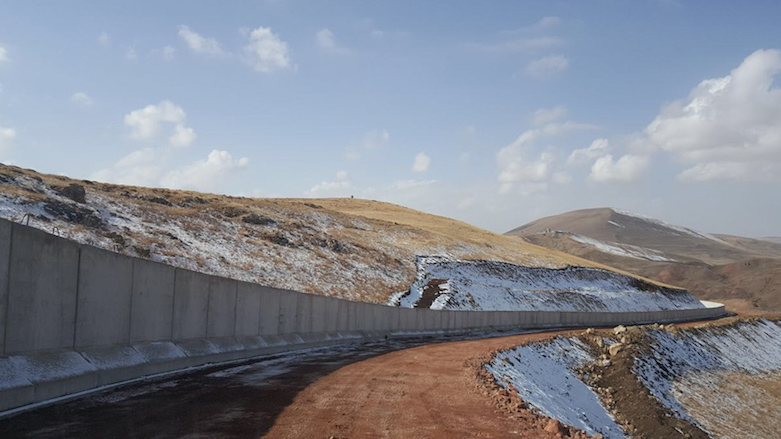Turkey finishes half of border wall with Iranian Kurdistan

ISTANBUL, Turkey (Kurdistan 24) – A Turkish state-owned construction company announced on Saturday that it had completed building half a concrete border wall along the country’s eastern border with Iranian Kurdistan (Rojhelat).
Prime Ministry’s Directorate of Social Housing manager Ergun Turan told the government-funded Anadolu agency the 144-kilometer (90-mile) long wall was built to keep rebel Kurdistan Workers’ Party (PKK) fighters active in the region at bay.
The wall and an accompanying road cover a northern area of the border in the Kurdish provinces of Igdir and Agri across Iran’s West Azerbaijan Province where Kurds also live.
Its construction began in August at the request of the Defense Ministry.
Concrete blocks weighing seven tons that the Turks have been planting along the border are two meters in width, three meters in height, and 30 centimeters thick.
Turan said they were planning to finish the project in the first six months of 2018.
Agri and Igdir Provinces, where Turkey’s highest peak Mount Ararat and the volcanic Mount Tendurek are, have been the scene of bloody clashes between the Turkish army and PKK fighters.
According to a March report by the state media, government forces conducted over 170 operations against the Kurdish fighters there in the past year, resulting in scores of casualties on both sites.
Turkey already built a 900-kilometer (560-mile) wall, the world’s third longest, in February across its southern border with Syria where the US-allied Kurdish parties have declared an autonomous region much to the protestations and threats of the Turkish leadership.
IRAN-TURKEY BORDER
The mountainous Iran-Turkey border which straddles from the Kurdistan Region in the south to Armenia in the north is one of the oldest in the world and has mainly stayed the same since the early 16th-century.
It saw a slight change for the first time in over 400 years when the two nations agreed on a territorial exchange at the beginning of the 1930s to help a young Turkish state crush the short-lived Republic of Ararat declared by the Kurds.
The 16th-century national Kurdish poet Ahmadi Khani lamented the separation of his people as well as their subjugation by the Turks of the Ottoman Empire and the Persians who were often fighting on Kurdish lands.
The modern border has three commercial crossings, yet smuggling is rife between the two sides which in turn leads to scores of civilian killings both by the Iranian and Turkish armies.
The porous frontier serves Kurdish rebels fighting the two militaries for larger political and cultural rights for the Kurds on both sides.
Iran is also fighting several armed Kurdish groups, including the PKK’s offshoot there—Kurdistan Free Life Party (PJAK).
Iranian officials have stated they did not object to Turkey’s wall and only asked for cooperation.
Editing by Karzan Sulaivany